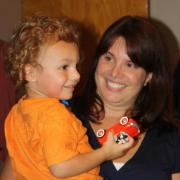Trauma Informed Care For Children of #MilFams
Every time I hear the statistics that 18 to 22 veterans commit suicide each day, I am heartbroken.
I wonder what more could have been done to help. Perhaps nothing, but I don't really believe that.
While I have never attempted suicide, I have experienced depression.
My husband deployed last year. While it was not my first deployment, it was the first deployment that really had an effect on my son.
After a tearful goodbye in the Fayetteville airport, I drove Ian and myself home. We napped, made dinner and started to live in our new normal. It would be a new normal with my husband being gone for an extended period of time.That night, Ian experienced night terrors that lasted the first two months my husband was deployed.
I tried to stick to a schedule and a routine as much as possible, but it was hard. I wanted the time to readjust to my husband being gone, but that did not seem to happen.
I allowed myself a couple of days to just be grumpy and cry. Then I picked myself up and got back to work. I knew I would need more grumpy days throughout the deployment and that it would be OK.
Ian turned 3 years old, and I planned another birthday party without my husband. As I cried over the phone to my best friend, I wondered how other spouses made it through. I felt as if my husband was gone all the time.
The first couple of months were not easy, but they weren't as hard as I had anticipated.
Professionally, I was excelling, and I loved it. Like most of my military spouse friends, I throw myself into my work while my spouse is deployed. I was thriving. Yes, there was that overwhelming sense of loneliness that nagged at my heart, but that was part of the deployment.
Sure, I wanted to tell my husband every moment of the day the new things I was doing, but I could not. I would save it up for Skype and emails.It was Ian that worried me the most. I didn't know children could have such a hard time with a deployment. I foolishly underestimated the depth of his emotions.
Ian's night terrors turned into nightmares. He started wandering the house in the middle of the night, and he was quick to cry. His separation anxiety was nothing I had ever experienced, and I felt helpless.
I read articles, found books, talked to my family and friends, and talked to the squadron first sergeant. I felt like if we could just make it until my husband got home, then we would be OK.
We were not OK, and we needed help.
I reached out to the military family life consultant at Pope Field. She figured it out that I was keeping myself so busy that I did not have to think about my husband being gone. I needed to really adjust to my new normal instead of just keeping busy.
Sadly, the consultant had to leave for Germany, and Ian and I had to start over again trying to find help.
I called up Military One Source and was informed that we were ineligible for assistance. My attention deficit disorder and Ian's age prevented us from getting help from them. Needless to say, I was displeased with the situation.oint out the flaws in Tricare, but this was the one area that I felt they did a good job. The process to find a family therapist was easy, and I made an appointment quickly.
Ian and I started therapy. Wouldn't you know, his nightmares were not as frequent, and he returned to being his happy toddler self? I slowed down and enjoyed my time with my son. Counseling made a difference in our lives.
I am sharing my experience so people will know that it is OK to get mental health help. My family was in crisis, and we needed help.
There is nothing shameful about mental illness. It's just an illness, like diabetes.
If we don't talk about mental health, then the statistic of 18 to 22 veterans committing suicide per day will never change.
If we stay silent, then families will continue to suffer. Getting help is a sign of strength, not weakness.
Do not suffer alone; get help when it is needed.
My family did, and we are better and stronger for it.
This post was originally published at fayobserver.com.



The views and opinions expressed in this post are those of the author(s) and do not necessarily reflect those of MomsRising.org.
MomsRising.org strongly encourages our readers to post comments in response to blog posts. We value diversity of opinions and perspectives. Our goals for this space are to be educational, thought-provoking, and respectful. So we actively moderate comments and we reserve the right to edit or remove comments that undermine these goals. Thanks!